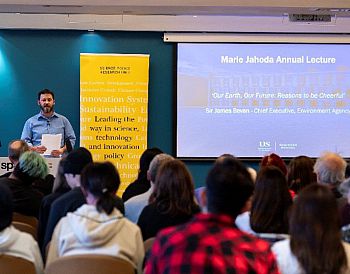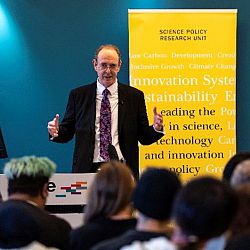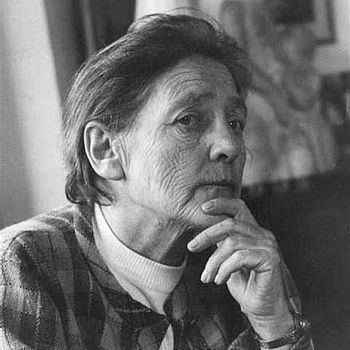Marie Jahoda Annual Lecture
On Monday 27 March 2023, the Science Policy Research Unit at the University of Sussex Business School hosted the Marie Jahoda Annual Lecture, welcoming attendees both in-person to our green Sussex campus and via live-stream.
Introducing the signature event, Professor Steven McGuire, Dean of the University of Sussex Business School, highlighted the immense contribution of the Science Policy Research Unit (SPRU) to the School’s distinctive reputation as a leading institution focused on driving innovation for social progress.
 During his opening remarks, Dr Adrian Ely, Reader in Technology and Sustainability at SPRU emphasised the key role of Marie Jahoda’s legacy within the pioneering research unit. Among her many activities whilst at SPRU, Jahoda provided overall guidance to the interdisciplinary group that responded to the Club of Rome’s ‘Limits to Growth’ report. This year marks the 50th anniversary of the SPRU response to that report, ‘Thinking about the Future: A Critique of The Limits to Growth’.
During his opening remarks, Dr Adrian Ely, Reader in Technology and Sustainability at SPRU emphasised the key role of Marie Jahoda’s legacy within the pioneering research unit. Among her many activities whilst at SPRU, Jahoda provided overall guidance to the interdisciplinary group that responded to the Club of Rome’s ‘Limits to Growth’ report. This year marks the 50th anniversary of the SPRU response to that report, ‘Thinking about the Future: A Critique of The Limits to Growth’.
The Club of Rome’s report used system dynamic models to predict that continuing economic growth would lead to environmental collapse, and called for a “transition from growth to equilibrium”. The SPRU team offered a different perspective, rejecting the notion of a zero growth economy and arguing instead for a shift in the composition of growth. Jahoda and colleagues argued that socio-political change could – by enabling such a shift – prevent collapse. In ‘Thinking about the Future’, Jahoda stated that “Man’s inventiveness in changing social arrangements is without limits”. 50 years later, is this optimism still justified? This question steered the event’s discussion, informing both the guest lecture and a panel discussion afterwards.
 It was a pleasure to welcome Sir James Bevan as our guest keynote speaker whilst in his former role as Chief Executive Officer of the Environment Agency. In this post, Sir James played a leadership role around climate change mitigation and adaptation, as well as a range of other environmental sustainability challenges including waste, water and flooding. Reflecting on his seven years leading the Environment Agency, the Sussex alumnus discussed his optimism for the future despite the various challenges facing society.
It was a pleasure to welcome Sir James Bevan as our guest keynote speaker whilst in his former role as Chief Executive Officer of the Environment Agency. In this post, Sir James played a leadership role around climate change mitigation and adaptation, as well as a range of other environmental sustainability challenges including waste, water and flooding. Reflecting on his seven years leading the Environment Agency, the Sussex alumnus discussed his optimism for the future despite the various challenges facing society.
In ‘Our Earth, Our Future: Reasons to be Cheerful’, Sir James proposed that in almost all parts of the world being a live human in 2023 is better than at any time in the past. To bolster this optimistic view, Sir James argued that improvements can be seen in the various areas that constitute a good life, such as improved health, greater wealth, democracy and human rights. Following this, he suggested five things that need to be true if we are to tackle the climate emergency successfully before reflecting on the positive work of the Environment Agency.
Watch the full talk below.
The acknowledgements in ‘Thinking About the Future’ state that Jahoda “made it possible for a diverse and sometimes unruly group to cooperate fruitfully” in the production of the book. In this spirit of cooperation across different intellectual and political positions, this year’s Marie Jahoda lecture was followed by a panel discussion in which SPRU colleagues discussed the legacy of the ‘Limits to Growth’ debate, and the implications for the future of science and technology policy.
Chaired by Dr Adrian Ely, we were delighted to welcome the following speakers to the panel, ‘Thinking about the future, 50 years on’:
Carlota Perez, Honorary Professor at SPRU, provided a historic overview, critiqued ‘populism’ and ‘degrowth’ responses to the current global situation, and discussed the various social, economic and political changes that could lead to a more sustainable and equitable world.
Saurabh Arora, Senior Lecturer in Technology and Innovation for Development at SPRU discussed the effects of alternative colonial modernities (whether based on growth or degrowth) on critical sustainability challenges and argued for radically different “decolonial transformations” of modern worlds.
Andrea Pérez Porres, second year doctoral researcher at SPRU discussed her research on social movements, considering how they understand the role of innovation and technological progress beyond economic growth.
The lecture series was first launched in 1997 to celebrate Professor Marie Jahoda CBE’s remarkable life and legacy both within her field and beyond, and it was a pleasure to welcome attendees in-person again following online-only attendance in previous years. We would like to thank all participants for their contributions to this year’s Marie Jahoda Annual Lecture, and for creating an engaging forum in which a diversity of perspectives was shared.
About Marie Jahoda
 Marie Jahoda was born in Vienna in 1907. In 1928 she earned her teaching diploma from the Pedagogical Academy of Vienna, and in 1933 her Doctor of Philosophy in Psychology from the University of Vienna. In 1937, she fled Austria, staying in England during World War II. In 1946 she emigrated to the United States. During her time there she worked as a researcher for the American Jewish Committee and Columbia University and as a Professor of social psychology at New York University where she founded the Research Centre for Human Relations.
Marie Jahoda was born in Vienna in 1907. In 1928 she earned her teaching diploma from the Pedagogical Academy of Vienna, and in 1933 her Doctor of Philosophy in Psychology from the University of Vienna. In 1937, she fled Austria, staying in England during World War II. In 1946 she emigrated to the United States. During her time there she worked as a researcher for the American Jewish Committee and Columbia University and as a Professor of social psychology at New York University where she founded the Research Centre for Human Relations.
Marie came to the University of Sussex in the 1960s and played a full part in the academic life of the University and its governance.
After her official retirement at 65 years old, Marie began a new period of active creative work participating in the interdisciplinary research of the Science Policy Research Unit (SPRU). She made major contributions to research programmes on social and technological forecasting and the social psychological consequences of prolonged unemployment.
Marie's work has been recognised with a prestigious Kurt Lewin Memorial Award from the American Psychological Association and was belatedly honoured by the German Social Democratic Party and by the Austrian Social Democratic Government. She was awarded an honorary degree by Sussex in 1973 and received a CBE in 1974.
Past lecture speakers
In 1997 the inaugural Marie Jahoda annual lecture was given by Sir Robert May, Government Chief Scientist.
Other speakers have included:
- Professor Helga Nowotny, founding member and former president of the European Research Council
- Professor Jeremy Farrar, Director of the Wellcome Trust Professor Jeremy Farrar
- Sir Paul Nurse, President of the Royal Society and Director of the Francis Crick Institute in London
- Professor Linda Wilson, President of Radcliffe College, Cambridge, MA
- Professor Chris Freeman, founder and first Director of SPRU
- Professor David King, Government Chief Scientific Adviser
- Baroness Sharp, House of Lords
- Lord Giddens, former director of the London School of Economics
- Professor Sir Gordon Conway, Chief Scientific Advisor, Department for International Development
- Sir Howard Newby, Vice-Chancellor, University of the West of England
- Professor Carlota Perez, Professor of Technology and Socioeconomic Development, Technological University of Tallinn, Estonia
- Professor John Beddington, Government Chief Scientific Adviser
- Calestous Juma, Professor of the Practice of International Development and Director of the Science, Technology, and Globalization Project at Harvard Kennedy School
- Professor Jennifer Rubin, Executive Chair of the Economic and Social Research Council
- Professor Michael Billig, Emeritus Professor of Social Sciences at Loughborough University